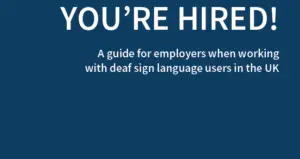Do deaf women feel safe on campus? A qualitative case study of one UK university
An article reporting on interviews conducted with five deaf women who work or study at one UK university to examine whether they feel safe on campus. They reported having more concerns because they are deaf, rather than because they are women. Recommendations are made for university campuses.
Published : 01/01/2024
Home » Do deaf women feel safe on campus? A qualitative case study of one UK university
With increasing attention to sexual misconduct on university campuses, universities have focused attention on campus safety, but safety systems are based on assumptions that people who live and work on campuses are able-minded and able-bodied. Any contemplation of campus safety needs to consider the intersectional experiences of students and staff. Considering the experiences of people from minoritised groups can provide insights into socially constructed notions of safety on campus.
One such minoritised group is deaf women. Using the broader concept of safety to mean ‘the state of being ‘safe’ and the condition of being protected from any harm or other danger’, this paper reports on interviews conducted with five deaf women who work or study at one UK university to examine whether they feel safe on the campus.
Four key themes were identified: (i) safety on campus, (ii) safety as a woman, (iii) safety as a deaf person, and (iv) accessible safeguarding. These five deaf women reported having more concerns because they are deaf rather than because they are women, but noted that the intersectional experience of being deaf and a woman create deeper safety concerns. Recommendations are made for university campuses to ensure that their safeguarding practices are accessible.
Other related resources
EDICa hosts a regular blog and seminars, as well as collecting a library of resources of equality, diversity & inclusion practices in research & innovation.

Representation & diversity in the sign language translation & interpreting profession in UK
Date: September 2022
Article on the diversity and representation of the sign language and interpreter profession, including recommendations.

Enabling NeuroDiverse Inclusive Science Careers
Date: 31st May 2022
Recommendations for how to make science careers more inclusive for neurodivergent researchers.

Guide for employers working with deaf sign language users
Date: 1st July 2019
A useful, research-based guide for employers on how to recruit, support and retain deaf sign language users.




































